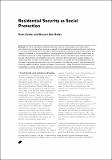| dc.contributor.author | Gazdar, Haris | en |
| dc.contributor.author | Mallah, Hussain Bux | en |
| dc.date.accessioned | 2016-01-11T16:53:43Z | |
| dc.date.available | 2016-01-11T16:53:43Z | |
| dc.date.issued | 01/07/2010 | en |
| dc.identifier.citation | Gazdar, H. and Mallah, H., B. (2010) Residential Security as Social Protection. IDS Bulletin 41(4): 42-51 | en |
| dc.identifier.issn | 1759-5436 | en |
| dc.identifier.uri | https://opendocs.ids.ac.uk/opendocs/handle/20.500.12413/7842 | |
| dc.description.abstract | This article argues that residential insecurity and social marginalisation are closely linked, particularly in communities where housing is accessed through traditional and patriarchal social institutions. It uses community histories from rural areas of the Sindh province in Pakistan to analyse the processes and impacts of a scheme for the regularisation of housing rights for the landless poor, with a special focus on mobilisation among the socially marginalised. Government schemes that require prior collective action on the part of beneficiaries can strengthen the process of political enfranchisement of groups already on an upward trajectory. On their own, however, such interventions can exclude the most marginalised who are too weak to organise collective action or to form themselves into effective groups. A comprehensive social protection agenda, therefore, requires both types of interventions – those that ensure the inclusion of the marginalised in ‘passive’ transfers and those that create incentives and reward collective action. | en |
| dc.format.extent | 10 | en |
| dc.publisher | Blackwell Publishing Ltd | en |
| dc.relation.ispartofseries | IDS Bulletin Vol. 41 Nos. 4 | en |
| dc.rights.uri | http://www.ids.ac.uk/files/dmfile/IDSOpenDocsStandardTermsOfUse.pdf | en |
| dc.title | Residential Security as Social Protection | en |
| dc.type | Article | en |
| dc.rights.holder | © 2010 The Authors. Journal compilation © Institute of Development Studies | en |
| dc.identifier.doi | 10.1111/j.1759-5436.2010.00151.x | en |

